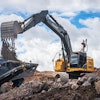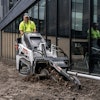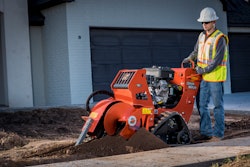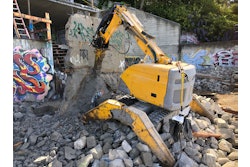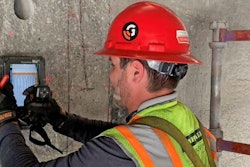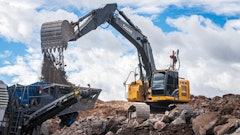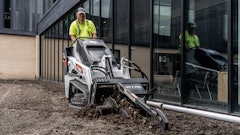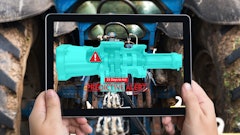
Business software and e-commerce tools aimed specifically at the rental industry are making important leaps in sophistication—the leap to the cloud, the leap to artificial intelligence (AI) and rapid evolution in supply chain management sophistication.
Here, we catch up with leadership of Point of Rental, Quipli and e-commerce upstart DOZR to learn what innovations are coming to market from each.
Point of Rental Reinvents Itself on the Cloud
Point of Rental Software provides smart, scalable rental and inventory management software to over 4,800 rental businesses and has served the space for almost 40 years. What that means though is that like other construction sector software products that have deep functionality, evolved over years of use in the market, Point of Rental has a construction equipment rental legacy software solution, Rental Expert and cloud-native solutions for the space, Essentials and Elite.
 At 40 years old, Point of Rental has its legacy Rental Expert solution, but also a portfolio of software-as-a-service (SaaS) products for construction equipment rental companies.Point of Rental
At 40 years old, Point of Rental has its legacy Rental Expert solution, but also a portfolio of software-as-a-service (SaaS) products for construction equipment rental companies.Point of Rental
In an email interview with Point of Rental CEO Wayne Harris, ForConstructionPros gained insights into how this transition to the cloud is going. As is the case in many software environments in and out of construction, a legacy solution designed for on-premise use may be migrated to the cloud as a hosted solution, while new, modern, SaaS solutions have to grow over time to become as functionally robust as their predecessor.
“Recently, Essentials, our cloud-native platform designed for retail businesses and small-to-medium businesses in the rental industry, has added a lot of flexibility-based functionality,” Harris said. “We’ve added the ability to create, select, report, and filter your delivery vehicles and your contracts by salesperson. This makes for better, more specific reporting. You can modify your rental processes, going straight to a reservation without writing a quote, and you can re-open items upon receiving if you didn’t get everything that was due back. On the roadmap for Essentials over the next year is the ability to define taxes by delivery area, create customer-specific job sites, set delivery fees for delivery windows, and adding e-commerce features like an availability calendar--if an item is unavailable, it will show when it’s next available on your online store.”
Elite, meanwhile, is a more direct competitor to Rental Expert, with the robust functionality to handle bigger, more complex operations.
“Over the past few months, we’ve added integrations to tax services to handle the complex, ever-changing tax structures across multiple districts, counties, states, and even countries,” Harris said. “We’ve built more mobile functionality and expanded our customer resource portal to include ‘how to’ videos in addition to system documentation. We’ve added price modeling, which allows users to apply a formula to price sales inventory and used rental equipment based on factors like age, hours used and repair costs.”
Other new developments in Elite include:
- Deepened integrations with the Point of Rental One app
- An enhanced public application programming interface (API) to facilitate custom software integrations with third-party solutions
- Shareable search views, so users can create their own customized dashboards and share them with teammates across work groups or company-wide
Rental Expert, meanwhile, is the company’s on-premise Windows-based software product, probably still the most feature-rich rental software in the industry.
“Expert will continue to receive relevant updates and we’ll continue to support it, but it’s just simply incompatible with today’s best development, user experience, support, and deployment options,” Harris said. “Elite blends Expert’s robust feature set with modern technology, new major features, a browser-based interface, single sign on (SSO) functionality, an improved self-reference and support experience … We’re also investing in areas, like e-commerce and mobile, where features can be shared across multiple products now that those APIs are available.”
Quipli Born in the Cloud
While Point of Rental makes an orderly but long-term shift from its legacy solution to the cloud, newcomer Quipli is born in the cloud as an efficient SaaS application set. While Quipli is younger and a small fraction of Point of Rental’s size, its product line is not as complex so it can invest all of its research and development efforts into one software application.
“We launched our first customer last May—so we are pretty young,” Quipli Founder and CEO Kyle Clements said in a debriefing with ForConstructionPros. “We started with online rental e-commerce—we are committed to helping our customers deliver the experience United Rental and Home Depot are, doing that totally white labeled if they want us to. But we know that to support this modern online rental experience, we need to offer a better overall rental management system, including inventory management, point of sale, payments and digital rental agreements.”
Founded in 2020, Quipli is ramping up its staff and has prioritized building out integrations to third party software products to make their solution more useful to equipment rental companies.
“We aim to be more of a modern cloud-based rental software,” Clements said. “Point of Rental is still the biggest and best—and they have some good private equity backing. But they also have a legacy product, and their cloud software is probably still catching up with that—it is likely not at parity.”
One area where Quipli is doing its best to catch up with Point of Rental is in standard integrations with other software.
“We have integrated with Quickbooks online,” Clements said. “We are working with Codat, and that relationship will unlock integrations with 20 different software products.”
Codat’s API integration platform offers more than 30 standard integrations to accounting, banking and commerce applications. These bidirectional integrations share data between applications in real time, enabling timely business decisions and delivering product availability insights to support transactions.
“For any area where we want to deepen what we offer our customers, we will make a build or integrate decision,” Clements said. “We are already integrated with Google to calculate accurate delivery times. Where we are going next—and this will be functionality we build –is towards more enterprise-level functionality for larger rental companies.”
More Powerful Rental e-Commerce Software
Because e-commerce has become omnipresent, and major rental houses like United Rentals have set a new standard for what an online rental experience should be like, smaller equipment rental businesses are making investments in web-enabled equipment reservation and rental.
“In early 2021, we acquired Rental Hosting, which provides e-commerce functionality that integrates completely with our software,” Harris said. “Rental stores can opt to be as transparent as they like with availability, pricing, spec sheets and more. Data updated within the software will automatically update on their online storefront, reducing data entry time, the cost of working with a web developer to update information, and eliminating opportunities for miscommunication. This can save counter staff lots of unnecessary work, as customers are able to answer most of their basic questions like cost, availability, and even equipment specifications on a company’s website. It’s even possible for them to reserve items and pay online.”
Rental Hosting includes features that make life easier for a rental company’s customers, including a customer portal for access to key account information. They can see what they have on rent, call items off rent, see their payment history and make payments.
Quipli, too, includes in its suite e-commerce capabilities, ensuring that rental functionality emulates tools end users are already familiar with like AirBnB, so equipment will be crossed off from inventory if it is not available within a rental window, revealing unambiguous supply signals for equipment that will be available at the appropriate time.
“We built our own inventory management to integrate with the web storefront,” Clements said, but he added that sometimes a rental company will want to obscure availability of their own inventory from the renting public. “We also make sure they can configure for overbooking and re-rent from someone else.”
The Quipli software delivers:
- White labeling, so a customer can brand their site their way
- Mobile features including a shopping cart
- The ability to edit landing pages, product pages and category pages so navigation can be structured around the business offering
- Shopify credit card processing
- Tax automation on the county and state level, based on location
- Search engine optimization tools
- A dashboard displaying sales, orders and traffic
Quipli is also planning to mirror other gig economy apps by enabling equipment rental companies to offer dynamic pricing, based on demand.
“These rental companies will have customers with negotiated rates—you may not dynamically price for those customers,” Clements said. “Really, this is about tracking new customers who will be offered rates based on demand. Uber is dynamically priced, Amazon is, and so is AirBnB. We will be launching this feature soon—and it is not just about increasing prices but also lowering prices to get higher utilization during times of low demand.”
 DOZR has launched WebStores, which delivers robust e-commerce web solutions to construction equipment rental companies.DOZR
DOZR has launched WebStores, which delivers robust e-commerce web solutions to construction equipment rental companies.DOZR
DOZR Introduces AI for Availability
Kitchener, Ontario-based DOZR in the meantime is assaulting the equipment rental market from two directions—with its DOZR.com multivendor marketplace and more recently through its DOZR Webstores SaaS offering for rental companies and Order Tracker offering.
WebStores is a software solution that allows rental companies to meet their customers' need for an ecommerce solution with touchless, paperless rental transactions seamlessly integrated into the supplier’s existing website and ERP systems. The e-commerce web sites delivered by WebStores can be white labled, reflecting only the rental company's branding. Since last year, the company has, according to DOZR co-founder and CTO Adeel Zaman in a briefing with ForConstructionPros, tripled its revenues and increased online transactions tenfold.
“A big part of our strategy is SEO,” Zaman said. “If you search for excavator rental or any other equipment category with rental terms, we want you to find equipment listings in DOZR.”
Apart from delivering e-commerce tools that drive rental equipment into Google search engine results pages (SERPs), Zaman said the company is also helping its customers buy Google Ads to drive traffic and build their business, even as the company focuses its marketing efforts on helping contractors grow.
“We are building a great blog called DOZR Hub, which is where contractors can go to learn how to build their business,” Zaman said. “From that thought leadership, we can introduce them to our core product.”
DOZR is also working towards machine learning approach to enabling equipment rental companies to surface anticipated availability of equipment currently out to rent.
“We will be allowing access to real-time availability information,” Zaman said. “Booking rental equipment is usually not like booking an airline seat. You are not guaranteed to get that equipment—the request goes to rental coordinator. It is just not known when things are returned, whether maintenance will be required when it is returned or whether equipment that is reserved will be cancelled. We are however identifying the different factors that will help give contractors visibility into whether or not equipment will be available. We already have this in the product, and are enhancing the machine learning capabilities. Solving this will eliminate a trillion-dollar problem in the industry. So we are taking into consideration the history of individual customer profiles and usage, the way an electrician may use equipment versus general contractor, and other factors. Then, when we are showing customer inventory, we are assigning probability in a color-coded graphic with green yellow red to give insight on whether the reservation is likely to be confirmed.”
Some equipment rental companies, however, will want to human engineer a solution the problem of availability so they can creatively find workarounds to avoid passing up rental opportunities.
“You can have an estimated time for dropoff listed on our e-commerce tool,” Clements of Quipli said. “But a number of customers just want to accept every single order and then figure out if they will approve it. They often want to take the order and then fulfill it on their own through subrenting.”
Subrenting for Supply Chain Certainty
DOZR is also preparing functionality for subrenting, while still driving automation for the process.
“There is a pilot program we have been working on that gives an equipment rental company access to rent seamlessly from other rental companies when desired,” Zaman said. “If you have a customer looking for a piece of equipment, they can decline or book via re-rental. It enables rental companies to rent from others and enables you to set parameters to enable a company to deliver the equipment themselves for image purposes.”
Point of Rental is offering subrental between dealers as well as tools to support a matrixed approach to equipment availability across multiple locations within the same business.
“Our software comes with lots of tools to help mitigate difficulties caused by supply chain shortages,” Harris said. “Rental stores are always straddling that edge of not having enough to rent out, but then if you always have equipment available, you’re probably wasting lot space and losing money. For multi-location businesses, we have multi-location inventory tracking, which allows staff to see what’s available not only at their location, but throughout the company and put in transfer requests. When you need to go outside of the company to fulfill an order, that’s what subrentals are for. We handle subrental tracking--you can create subrental contracts, select vendors, enter information for tracking purposes, and manage payments. These kinds of transactions have been common throughout the existence of our software; they just play a bigger role now that it’s harder for everyone to get the equipment and/or parts they need."
An equipment rental business also may experience shortages of parts or consumables required to keep their equipment rental fleet operational and ready to generate revenue. When it comes to this problem, Harris says an ounce of prevention is worth a pound of cure.
“Telematics can play a huge role in increasing equipment uptime and reducing the need for parts,” Harris said. “So Elite can pull in AEMP standard information. Or, if you want even more data, it integrates with companies like Trackunit. This enables our rental company customers to see their machines’ data remotely and intervene when something may be wrong. Sending maintenance staff out to service or replace a piece of equipment before it becomes a much more costlier repair can be a lot easier than trying to find replacement parts right now.”


